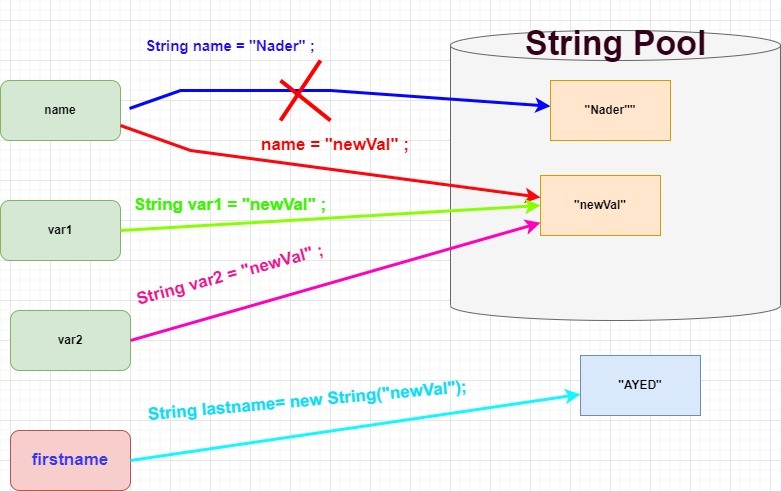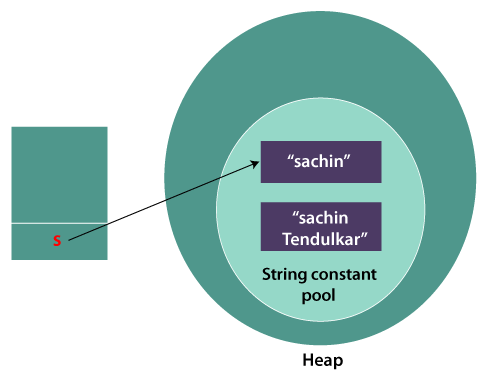Why Are Strings Immutable in Java? Safety And Security and Efficiency Advantages
Why Are Strings Immutable in Java? Safety And Security and Efficiency Advantages
Blog Article
What Is Immutable Strings and How It Functions
In the world of programs, comprehending the principle of unalterable strings is critical for creating protected and durable applications. Immutable strings describe strings that can not be altered after they are developed, guaranteeing information integrity and predictability within the code. This essential principle plays a crucial function in various programming languages and offers a special method to managing information. By exploring the ins and outs of just how unalterable strings work, one can discover a globe of advantages and opportunities that can elevate the high quality and performance of software program development.
The Essentials of Unalterable Strings
Unalterable strings, as a basic idea in programming, are personality sequences that can not be transformed when they are created. This suggests that when a string is appointed a worth, that worth can not be modified. In languages like Python and Java, strings are unalterable objects, resulting in different ramifications in terms of memory monitoring and information honesty.
Among the vital benefits of immutable strings is that they give a feeling of safety and security in data manipulation. Since the material of an unalterable string can not be changed, it ensures that the initial information continues to be intact, minimizing the danger of unplanned modifications throughout program execution (Why are strings immutable in Java?). This residential property also simplifies debugging processes, as programmers can rely on that once a string is specified, its value will not be unintentionally altered
Moreover, unalterable strings facilitate reliable memory usage. When a brand-new string is created based on an existing one, instead than changing the original string, the new value is kept independently. This approach enhances performance by minimizing memory fragmentation and simplifying memory allocation procedures. Generally, comprehending the essentials of unalterable strings is crucial for mastering shows concepts and optimizing code efficiency.
Advantages of Unalterable Strings
Structure upon the safety and security and performance advantages of immutable strings, their benefits reach improving code dependability and simplifying simultaneous programs jobs. By being unalterable, strings can not be changed after creation, which gets rid of the danger of unintentional modifications in the information they store. This intrinsic immutability ensures that when a string is produced, its value continues to be constant throughout the program's execution, lowering the possibilities of bugs created by unanticipated modifications.
Additionally, immutable strings contribute to code reliability by making it simpler to reason concerning the state of a program. Because strings can not be altered, developers can trust that a string will certainly constantly hold the same value, streamlining debugging and maintenance initiatives. This predictability brings about a lot more secure and reliable codebases.

Application in Programming Languages
Within different programming languages, the unification of immutable strings is a basic facet that affects just how information is managed and controlled within code structures. The application of unalterable strings varies across different shows languages, with each language providing its own mechanisms to sustain this idea.

On the other hand, languages like C and C++ do not have integrated support for unalterable strings. Designers in these languages need to manually implement immutability by applying guidelines within their code to stop direct modifications to string objects.
Finest Practices for Functioning With Immutable Strings
When handling immutable strings in programming languages like Java and Python, adhering to finest methods makes certain reliable and safe and secure data adjustment. Among the key best practices is to make use of StringBuilder or StringBuffer rather of straight controling strings, particularly when managing extensive concatenation procedures. These classes offer mutable alternatives for string manipulation, aiding Get More Info to prevent unneeded memory appropriations and improving performance.
Furthermore, when functioning with delicate data such as passwords or API keys, it is important to prevent keeping them as ordinary text in immutable strings. Making use of safe storage systems like char varieties or specialized collections for managing delicate info aids alleviate protection risks linked with immutable strings.
Real-world Applications and Instances
Exploring sensible implementations of unalterable strings in various industries discloses their considerable influence on data stability and system reliability. In the healthcare market, unalterable strings play an essential duty in making certain the protection and confidentiality of patient data. By preventing unauthorized alterations to sensitive information such as clinical records and prescriptions, immutable strings aid preserve conformity with rigorous personal privacy regulations like HIPAA.
Economic establishments likewise gain from the unalterable nature of strings to boost the security of consumer information and deal records. Unalterable strings assist stop scams and unauthorized modifications to monetary info, giving a robust defense versus cyber dangers and making certain the count on and self-confidence of clients.

Conclusion
Best methods for working with immutable strings include avoiding direct adjustments and utilizing methods that return new string objects. Real-world applications of immutable strings consist of data encryption, caching, and string control tasks.
Unalterable strings refer to strings that can not be altered after they are created, guaranteeing information stability and predictability within the code. When a brand-new string is developed based on an existing one, rather than customizing the original string, the new worth is stored independently.In languages like Java and Python, strings are immutable by default, suggesting that as soon as a string item is produced, its value can not be changed - Why are strings immutable in Java?. Finest methods for functioning with immutable strings consist of avoiding direct alterations and making use of techniques Learn More Here that return brand-new string items. Real-world applications of unalterable strings consist of information security, caching, and string adjustment tasks
Report this page